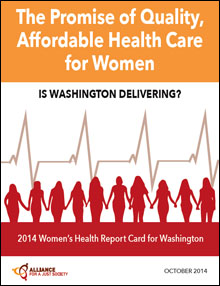STATE GOVERNMENT
State ranks 23rd, gets ‘C+’ on Women’s Health Report Card
 SEATTLE (Oct. 15, 2014) — Washington is ranked 23rd in the country and received a final grade of “C+” in the 2014 Women’s Health Report Card released Tuesday by Washington CAN! and NARAL Pro-choice Washington. The report card provides an important measure of the state’s record on women’s health as politicians court women voters ahead of the November elections and continue to debate how to combat persistent racial disparities in health.
SEATTLE (Oct. 15, 2014) — Washington is ranked 23rd in the country and received a final grade of “C+” in the 2014 Women’s Health Report Card released Tuesday by Washington CAN! and NARAL Pro-choice Washington. The report card provides an important measure of the state’s record on women’s health as politicians court women voters ahead of the November elections and continue to debate how to combat persistent racial disparities in health.
Click here for the 2014 Women’s Health Report Card for Washington
“This report card shows Washington has an average record on women’s health. We’re failing women and the families that depend on them, and we’re especially failing women of color,” said Rachel Berkson, NARAL Pro-choice Washington. “These grades should serve as an urgent call to action for Washington leaders. It’s time to get past political gridlock and take concerted action to improve women’s health. The first step our elected leaders need to take is ensuring that all women in Washington, regardless of income, have access to the full range of reproductive health care and family planning services they need to be healthy.”
Washington’s final rank and grade focus on three areas: health coverage for women, women’s access to health care, and women’s health outcomes. On coverage, Washington ranked 22nd in the country, a grade of C+. On access to health care and health outcomes, Washington ranked 24th, a C grade.
“Washington has an opportunity to improve its overall record on women’s health, catch up with other states that are performing better, and be a leader on eliminating race-based disparities,” said Joelle Craft, a community leader at Washington CAN! “But if state lawmakers continue to drag their feet, we’re only going to fall further behind other states. Women who are denied health care, and the families who depend on them, will pay the price.”
Looking at women’s health by race, the report card finds Washington is doing an even worse job meeting the needs of women of color, who are uninsured at higher rates and also face worse health outcomes than women overall, adding urgency to the debate over eliminating racial disparities.
“Politicians must put aside partisan bickering, advocate for women, and take action to improve women’s health by moving forward with a proactive health equity agenda,” said LeeAnn Hall, executive director of the Alliance for a Just Society, which produced the report card. “Our families, our communities, and our economy depend on women – women must be able to depend on their state’s to deliver on the promise of quality, affordable health care.”
The 2014 Women’s Health Report Card uses the latest available data from government sources to rank Washington among the 50 states on 30 measures (and more than 50 individual data points) relating to women’s health issues. It generates state rankings and grades, analyzes race-based disparities, and includes specific recommendations for state action to improve women’s health.





